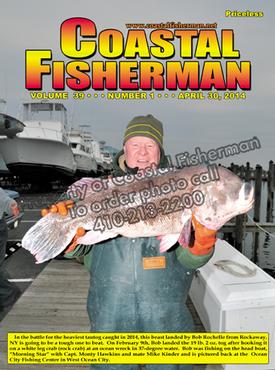


Article by Capt. Mark Sampson
 With the first issue of the Coastal Fisherman now on the streets there can certainly be no argument that the new fishing season is officially underway! As always, the start-up of a new season also means that a number of proud anglers will be doing their fishing from a brand new boat this year, and a part of the joy, or in some cases the “dilemma” of getting a new boat is the task of choosing a name for the vessel.
With the first issue of the Coastal Fisherman now on the streets there can certainly be no argument that the new fishing season is officially underway! As always, the start-up of a new season also means that a number of proud anglers will be doing their fishing from a brand new boat this year, and a part of the joy, or in some cases the “dilemma” of getting a new boat is the task of choosing a name for the vessel.
Naming boats after women and referring to them in feminine terms is a tradition that’s been going on for hundreds of years. I have no idea how that tradition got started, but I do remember as a kid being told by an old captain, “If you treat your boat like a lady she’ll always be good to you.” At the time it didn’t mean much to me, but now that I’m older and have had a bit more “schooling” by both boats and women, I can better understand what the fellow was trying to tell me, and the following are a few lessons I picked up along the way.
Pay attention to what she says, even when her complaints seem minor and unimportant.
There’s a lot that can go wrong on a boat very suddenly and without warning, but usually a vessel will give it’s owner subtle hints that something is not quite right before she has a major malfunction. A swelling in a battery cable means that there is corrosion eating away at the wiring under the insulation. A little bit of salt accumulation on an engine means that a hose or gasket is starting to leak. Bits of powdery black rubber around the front of an engine means the fan belt is wearing away and a bilge pump that comes on frequently indicates a seawater leak. A concerned skipper will pay attention to what his boat is telling him and do whatever is necessary to correct little problems before they turn into catastrophes.
Don’t dump her just because she gets a little age on her.
A properly maintained boat can live a long time. Sure, over the years systems will fail, parts will wear out, the hull will lose its shine and she might get a few dings or even cracks in her. But the great thing about boats is that no matter how old or how beat-up they might be, there is almost nothing that cannot be replaced or repaired. Even a total wreck of a boat can have life breathed back into her if she’s stripped down to bare-nothing and refitted with all new wiring, engine(s), controls, electronics and so forth. Of course, this requires that the owner has both the resources and the commitment to see that such a project is done properly from start to finish.
Don’t neglect her for long periods of time and then think you can just get back with her and everything will be as it was before.
Boats don’t take well to being ignored for any length of time. Owners who think they can park their rig somewhere, forget about it for weeks or months at a time and then come back to use it and everything will be just as it was the last time they were together, will often be in for an unwelcome surprise. Things can go wrong on boats when they aren’t being used just the same as when they are. Corrosion, deterioration of fuel, harsh affects from the sun, freezing temperatures, moisture damage and so many other issues can wreak havoc with a boat that’s not properly put-up and prepared for long-term inactivity.
Don’t look at other girls.
A lot of captains start out with a boat that makes them happy and have every intention of keeping for a long time. But after a while, everywhere they look they see boats that are newer, faster, bigger, prettier and decked out with more accessories than the one they have. There’s certainly nothing wrong with noticing other boats and acknowledging their amenities and capabilities, but if they get so infatuated with “other boats” that they begin to look critically at their own, they’ll start to lose interest in properly keeping, maintaining and even using the one they have which will be the beginning of the end for that boat/skipper relationship.
It’s your job to make sure that she stays safe at all times.
No one will take care of your boat as well as you will. Marina employees, friends, neighbors, family members; when big storms come along that require extra measures to keep a boat safe from damage there can be a lot of kindly folks willing to help out. But it’s ultimately up to the boat owner to make sure that their vessel is always being properly looked after by people with the right skills and a commitment to do whatever is needed to keep the vessel safe. Whatever it takes, if you own a boat the buck stops with you to keep it safe and well maintained at all times – till death do you part!
Captain Mark Sampson is an outdoor writer and captain of the charter boat “Fish Finder”, docked at the Ocean City Fishing Center.